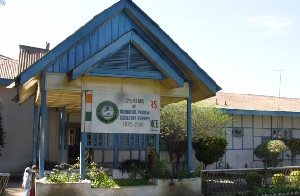In the ongoing hearing of the Arunachal Pradesh matter before the constitution bench at court no 3, it was the turn of the senior advocate, TR Andhyarujina, to make his submissions today on behalf of the Governor.
The bench grilled Andhyarujina on the scope of Article 179 [c] which deals with the removal of the Speaker by a resolution of the Assembly passed by a majority of all the then members of the Assembly. The article has a proviso saying that no such resolution shall be moved unless at least 14 days’ notice has been given of the intention to move the resolution.
The bench appeared keen to know whether this constitutional provision stood fulfilled in the removal of the Speaker by the assembly on 16 December.
Justice Dipak Misra posed a pointed question asking whether the Governor’s discretion to summon the House to fulfil this Constitutional provision could be called constitutional discretion.
Andhyarujina said the removal of the Speaker should not be postponed, and the discretion of the Governor to advance the assembly session for this purpose cannot be faulted with.
Misra said discretion must be based on a constitutional principle, and asked Andhyarujina to explain what is the constitutional principle behind this discretion of the Governor.
Andhyarujina explained that the principle is having the assembly as early as possible. “There can’t be a gap of 42 days for the removal of the Speaker, because the Speaker enjoys vast powers outside the assembly under the 10th Schedule to the Constitution [dealing with disqualification of a member on the ground of defection.]. Governor was conscious of this fact”, he told the bench.
Misra joined issue with the counsel by saying that the Governor has the obligation to ensure that the 10th Schedule is complied with in a proper manner.
Andhyarujina said the Governor was aware of the fact that Speaker may exercise his powers under the 10th Schedule to disqualify MLAs, and this is what happened when he disqualified 14 MLAs on 14 December. The Governor was keen that the cloud over the Speaker should be removed.
When Misra asked Andhyarujina whether the Governor can use his discretion to keep the 10th Schedule in abeyance, Andhyarujina alleged that the Speaker was hands in glove with the ruling party, and the Governor apprehended disqualification of MLAs to consolidate power.
“Was it constitutional apprehension of the Governor?” quipped Misra.
Andharujina then said when a discretion is given to a Constitutional authority, you can’t sit in judgment and say you could have done this, or could not have done that. There has to be some leeway; you can accuse the Governor of taking wrong action, but not mala fide, he said.
Misra said the question is whether there is constitutional permissibility for exercising discretion.
To this, Andhyarujina gave a surprise answer saying there is scope for exercising discretion, as long as there is no prohibition in the Constitution. There is no bar on the Governor to use his discretion to advance an assembly session, he suggested.
Justice JS Khehar immediately joined issue with Andhyarujina saying the Constitution expressly mentions if there is a discretion to be exercised by the Governor; but you are putting it the other way around, he said.
To this, Andhyarujina said Article 163 recognises discretion de hors in certain cases. There are many instances which are not stated in the Constitution. In Article 174, discretion is implied, he said.
Andhyarujina further said if discretion is irrelevant and nonsensical, it is a different matter; but this is not such a case, he argued.
“What wrong the Governor did?” Andhyarujina asked, and suggested that Arunachal Pradesh is a sensitive state and has been subjected to political tribulations. He also defended the Governor’s report recommending imposition of President’s rule in the State in view of the peculiar conditions in the State.
Andhyarujina tried to give Governor’s discretion a high status in the Constitution. Article 163(2) which protects Governor’s discretion is a unique provision in the original Constitution, he said. Citing the Kesavananda Bharati judgment, he said constitutional review is part of the basic structure.
Drawing from the Constituent Assembly Debates, he said Ambedkar wanted the Governor to exercise discretion, and that was why it was given Constitutional protection.
The hearing will continue tomorrow at 10:30 AM

threads most popular
thread most upvoted
comment newest
first oldest
first
dictionary.law.com/Default.aspx?selected=1041
A definition is in order: "At common law joinder of issue occurs when one party pleads that an allegation is true and the opposing party denies it, such that both parties are accepting that the particular issue is in dispute."
threads most popular
thread most upvoted
comment newest
first oldest
first